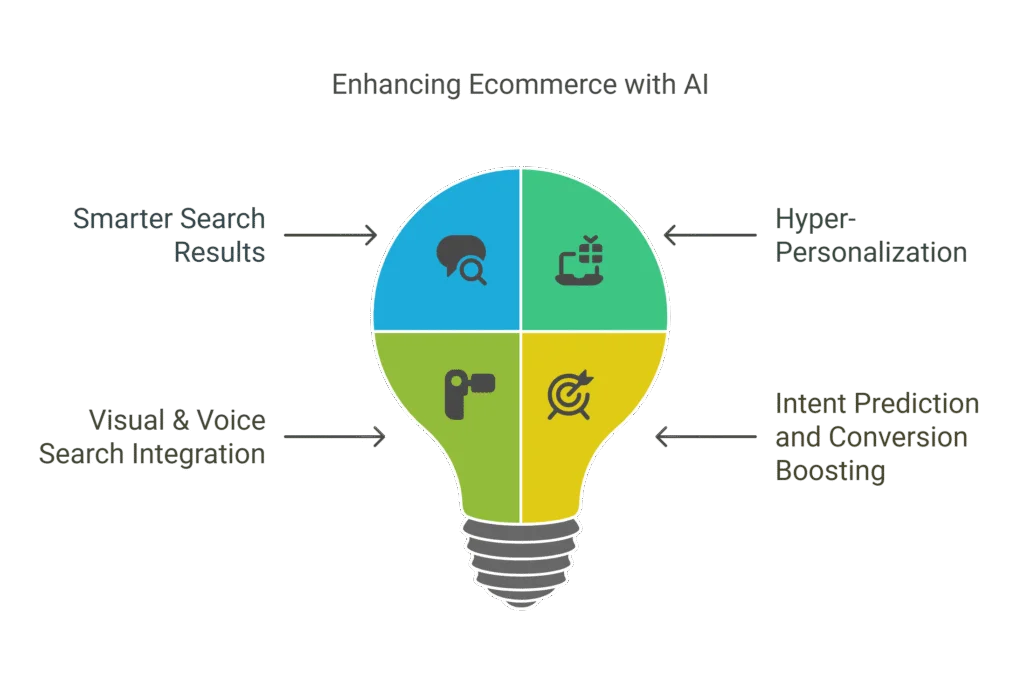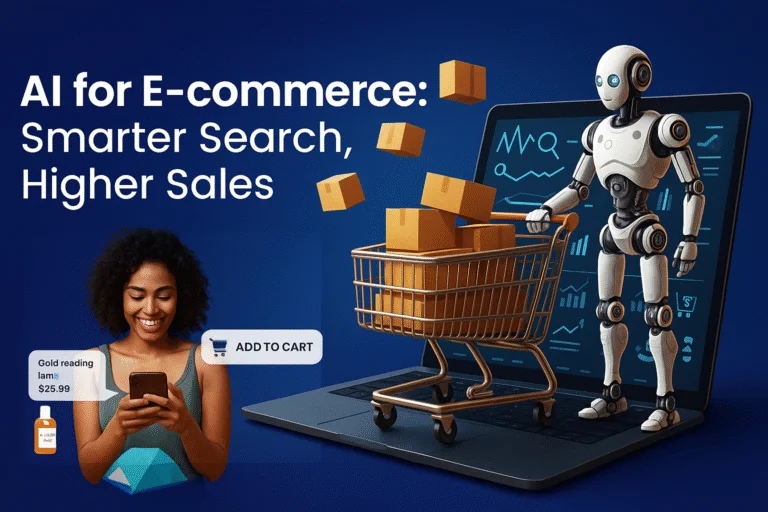In the digital marketplace, the power struggle is no longer between price or product, it’s between experiences. And the smartest experience wins. That’s where AI for ecommerce enters the chat, reshaping how users discover, engage with, and buy products. From intelligent search to hyper-personalized recommendations, AI is the engine behind seamless, scalable online shopping.
This blog dives deep into how AI transforms e-commerce search, user experience, and revenue outcomes and how you can plug into it today.
Why AI Matters in Ecommerce Search
Search is more than a utility, it’s a high-converting revenue lever. But traditional keyword-based search falls short:
- Misses misspellings and synonyms
- Ignores user context or intent
- Returns irrelevant or outdated results
AI-enhanced search fixes this by using machine learning, natural language processing (NLP), and semantic understanding to match results more like a human would.
Key Benefits of AI in Ecommerce

1. Smarter Search Results
AI deciphers meaning, not just words. A query like “formal red shoes for wedding” returns category-filtered options, not random red sneakers.
AI capabilities include:
- Natural language understanding
- Synonym expansion
- Fuzzy matching for typos
- Real-time indexing of inventory changes
2. Hyper-Personalization
AI doesn’t just respond, it learns. With every click, scroll, and purchase, it refines the user’s experience.
AI-driven personalization delivers:
- Tailored product recommendations
- Re-ranking based on user behavior
- Location, time, and device-specific results
3. Visual & Voice Search Integration
Today’s consumers shop with their eyes and voices, not keyboards.
AI supports:
- Visual search: Upload an image and get lookalike items
- Voice search: Say “leather laptop bag under $100” and get exactly that
4. Intent Prediction and Conversion Boosting
AI recognizes where a shopper is in the funnel, whether they’re browsing, comparing, or ready to buy and adapts content accordingly.
Features include:
- Smart banners or CTAs
- “Frequently bought together” bundles
- Abandoned cart triggers based on engagement signals
Real Use Cases in Shopify & Other Platforms
- Search bar with autocomplete that gets smarter daily
- Product recommendations that adapt by the hour
- Filters that learn from user clicks, not just pre-set logic
- AI chatbots guiding search for high-ticket items like furniture or tech
Getting Started with AI in Ecommerce Search
1. Audit Your Existing Search Setup
Start by measuring:
- Search abandonment rate
- Zero-result queries
- Bounce rates on search pages
2. Choose the Right AI Tool
Look for platforms that offer:
- Customizable AI models
- Easy integrations with Shopify, WooCommerce, Magento
- Transparent analytics dashboards
Why Expertrec Is a Powerful AI Partner
Expertrec offers a no-code, plug-and-play search solution built for AI-native e-commerce experiences. Here’s what makes it stand out:
- Semantic search understanding—go beyond keywords
- Personalized search results—influenced by real-time user behavior
- Voice & image search support—mobile-first capabilities
- Analytics dashboards—see top queries, zero-result terms, and product engagement
- Simple Shopify integration—install and go live within minutes
Whether you’re a growing DTC brand or an established store, Expertrec helps you turn searches into sales—without rebuilding your backend.
Conclusion
AI for e-commerce isn’t just a buzzword, it’s the backbone of modern digital retail. From smarter search to intuitive recommendations, AI transforms how users connect with your catalog. As shopping behavior evolves, intelligent, adaptive systems will define the winners.
Don’t let clunky search or outdated filters hold your growth back. Implement AI-powered tools like Expertrec and create a storefront that thinks as fast as your customers shop.
Frequently Asked Questions
1. Is AI hard to implement in my existing Shopify store?
Not with tools like Expertrec, it integrates in minutes with no coding required.
2. Will AI work if I have a small product catalog?
Yes! AI improves even small stores by learning patterns and enhancing discovery.
3. What kind of ROI can I expect?
Improved conversion rates, increased average order value, and reduced bounce are typical outcomes.
4. Can I track how well AI search performs ?
Absolutely. Use search analytics to monitor performance, top queries, and optimize further.
5. Does AI replace my current search bar?
It enhances it, making it more accurate, more flexible, and more human-like in understanding.




